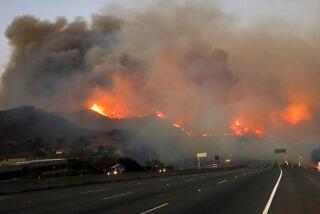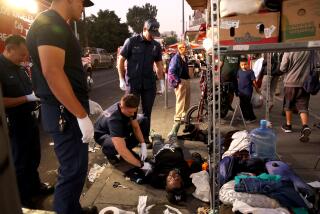Bills for County Air Rescues Go Unpaid : Budget: Funding to save helicopter unit was to come in part from charges to users. But only seven have made full payment.
An elite helicopter rescue unit--already cut to the bone in last year’s Los Angeles County budget--may be grounded permanently for lack of money, leaving thousands of rural residents without emergency medical help.
But this year’s budget crunch may be only part of the reason for the unit’s predicament.
The sheriff’s Air 5 helicopter was spared last year after the Board of Supervisors voted to charge a user fee of nearly $1,400 for each rescue, hoping the money would help offset the unit’s $900,000 annual cost.
But since the fee went into effect last winter, the county has only collected $9,700, prompting criticism of the department’s lax efforts and questioning of its commitment to what supporters say is the finest rescue unit in the country.
Of the 137 bills sent out since December, the department’s fiscal services division has received full payment for seven. Five of those reportedly were referred to an outside agency for collection by frustrated sheriff’s deputies.
Close to 95% of the bills--amounting to nearly $177,000, or more than one-fifth of the unit’s annual budget--have yet to be paid. By comparison, the Los Angeles City Fire Department collects about 70% of the bills it sends out for ambulance and helicopter transport.
“I don’t know why they are dragging their feet,” said Deputy David Rathbun, assigned to the unit for the last 22 years. “They aren’t even trying. These things just sit.”
Critics such as Rathbun complain that sheriff’s officials are using threats to ground Air 5 as a political ploy to fend off further cuts in the department’s budget. They contend that if the department is interested in keeping its services intact it should more aggressively pursue the additional revenue sources such as fees for rescues.
Sheriff’s officials say they are doing everything they can to collect the fees. But they say they are public servants, not bill collectors, and are not about to bang on victims’ doors demanding money.
“The sheriff would never stand for that,” said Fred Ramirez, director of the department’s administrative services. Ramirez said a number of factors have slowed collections.
First, the department’s fiscal services division is unaccustomed to--and slightly uncomfortable with--billing private citizens for emergency services. Most of the charges levied by the department are to cities and other agencies that contract with the county.
“Billing private people is quite a bit different,” said Chief Larry Anderson, director of sheriff’s field operations for east Los Angeles County who oversees Air 5. “We’re pretty new at this.”
Second, the department is reluctant to use strong-arm tactics to collect. After a third billing notice is sent out, Ramirez said, the matter is usually dropped. The department is considering turning over billing services to a private contractor, which probably would be more aggressive than the county.
Finally, Ramirez and Anderson said, sheriff’s officials never expected the fees to completely cover Air 5’s operations. Early estimates indicated that the department would collect on only 30% of the bills it sent out because many patients would be uninsured and poor.
Nonetheless, Board of Supervisors Chairman Ed Edelman said: “We need to get all the revenue we can get.”
The unit only operates four days a week from its station in Barley Flats above Pacoima and has a staff of six deputies, down from 17 last year. Most of the other deputies, all trained as paramedics and scuba divers, were transferred to other duties.
Threats to ground Air 5 permanently anger longtime deputies on the unit.
“It’s a political chess game and it’s being played at our expense and the expense of the citizens of Los Angeles County,” said Deputy Jerry Despues, who has been assigned to the unit for most of the last 12 years. “I think they are going to phase Air 5 out. The department on a constant basis has been undermining the emergency services detail and this is the perfect opportunity to just let it go.”
The 1993-94 Los Angeles County budget released last week proposes to cut more than $1.5 billion from an array of public services.
Sheriff’s officials have threatened to close jails and local stations, but deny that they are dragging their feet in collecting fees for Air 5 so they can plead poverty.
The unit performs mountain rescues and airlifts patients in remote parts of Los Angeles County--including vast stretches of the Antelope Valley--that are more than 30 minutes by car from the nearest medical facility. It is among the most popular--and visible--of the department’s services.
Rural residents such as Cande Gustavson have rallied in recent weeks to save the unit. Two years ago, Gustavson’s son, Jake, went into seizures, the first indication of what was eventually diagnosed as brain cancer.
After a 12-minute flight from Gustavson’s Lake Los Angeles home to Antelope Valley Medical Center in Lancaster, Jake stopped breathing as the helicopter touched down. But because he was already at the hospital, doctors were able to revive the child, then 6. Without Air 5, Gustavson said, her son probably would not be alive today.
Deputy Ron Unger, transferred out of Air 5 when the unit was scaled down, said stories like Gustavson’s are common among hundreds of missions each year. The unit also performs swift water and scuba rescues and coordinates search and rescue operations for people missing in the mountains.
“If it were my wife and kids at the bottom of a canyon, I would want Air 5 to come in,” Unger said.
More to Read
Sign up for Essential California
The most important California stories and recommendations in your inbox every morning.
You may occasionally receive promotional content from the Los Angeles Times.










